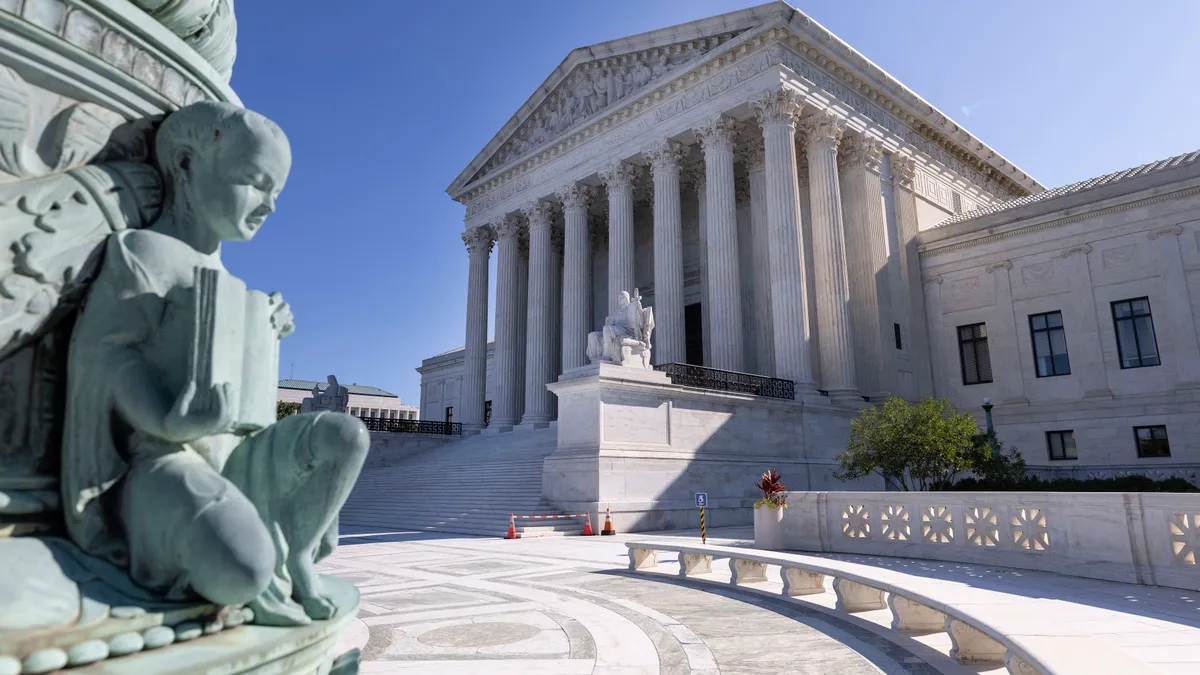The Supreme Court on Monday agreed to hear a case challenging the constitutionality of the Consumer Financial Protection Bureau’s funding structure, a case that could threaten the agency’s very existence.
The decision comes four months after a federal appeals court ruled that because the CFPB receives funds from the Federal Reserve and not Congress, the bureau’s funding apparatus violates the separation-of-powers principles in the U.S. Constitution.
The Biden administration has asked the high court to hear its appeal of that ruling. The case was brought in 2018 by two payday lender trade groups, Community Financial Services Association of America and the Consumer Service Alliance of Texas.
The bureau, which was created under the 2010 Dodd-Frank Wall Street Reform and Consumer Protection Act in the wake of the 2007-08 financial crisis, welcomed the high court's decision and expressed confidence in the constitutionality of its funding mechanism.
"As it did for the Federal Reserve Board and other federal banking regulators, Congress authorized the CFPB's funding through legislation other than annual spending bills," a CFPB spokesperson said, adding there is nothing "novel or unusual" about the way in which the agency receives funding. "This type of funding is a vital part of the nation's financial regulatory system, providing stability and continuity for the agencies and the system as a whole."
In a statement Monday, Sen. Elizabeth Warren, D-MA, one of the bureau’s staunchest defenders, said previous lower court decisions have consistently ruled in favor of the CFPB, despite repeated efforts by Republicans and lobbyists to dismantle the agency.
“[T]he constitutionality of the CFPB and its funding structure have been upheld time and time again,” said Warren, who was instrumental in the agency’s creation in 2010. “If the Supreme Court follows more than a century of law and historical precedent, it will strike down the Fifth Circuit’s decision before it throws our financial markets and economy into chaos.”
Republican opposition to CFPB
Republicans, however, have long called the CFPB a rogue agency that has overstepped its authority.
“As Republicans have said for years, the CFPB’s unconstitutional funding structure improperly insulates it from Americans’ representatives in Congress,” House Financial Services Committee Chairman Patrick McHenry, R-NC, said in response to the Supreme Court’s decision to hear the case. “This problem is compounded when the Bureau is led by a rogue regulator, as it is now. Director [Rohit] Chopra is returning the CFPB to its Obama-era regulation by enforcement approach that harms both consumers and our economy”
The House Financial Services Committee is committed to bringing “the unaccountable CFPB under the annual appropriations process,” he added.
The trade group Online Lenders Alliance said it too hopes the Supreme Court’s decision to hear the case will result in increased accountability at the agency.
“Supporters of the CFPB have long called the Bureau a ‘cop on the beat’, playing an important role in ensuring accountability from companies providing financial services and products,” OLA Executive Director Andrew Duke said in a statement. “But cops on the beat also have to be accountable for their actions and we hope that the Supreme Court’s review will result in a greater fairness, transparency, and accountability – which will better serve America’s consumers.”
The Consumer Bankers Association said it is ready to work with policymakers, should the Supreme Court uphold the Fifth Circuit ruling.
“[W]e firmly believe in the role the agency has played and can continue to play in providing consumers the highest level of protection; however, there is no doubt, to truly deliver on its mission, the Bureau is in need of reform,” CBA President and CEO Lindsey Johnson said in a statement on Monday.
The CFPB has faced a constitutional challenge to its structure before. In 2020, the Supreme Court ruled 5-4 that the agency’s leadership structure was unconstitutional. That ruling determined that the president can fire the director of the agency “at will.”
That case was brought by a California debt collection law firm, which argued it should not have to comply with a CFPB civil investigative demand because the bureau’s leadership, which could only be removed “for cause,” violated the Constitution’s separation-of-powers rule.
CFPB’s existence at stake
While the Supreme Court will rule on whether the lower court’s payday rule should be invalidated, the decision could set a precedent for future actions, challenging everything the CFPB has ever done, said Scott Pearson, a partner and leader in the law firm Manatt, Phelps & Phillip's consumer financial services practice.
“And yes, it could lead to the end of the CFPB,” he added.
Pearson said it’s likely the Supreme Court will find the bureau’s funding structure unconstitutional, but it isn’t clear whether it will determine the bureau’s past actions are invalid as a result.
“The court might look for some sort of middle ground, perhaps staying its decision for a period of time to give Congress a chance to fix the agency and perhaps ratify some of its prior actions,” he said.
A change to the agency’s funding structure means it would have to justify its budget to Congress every year as part of the appropriations process, Pearson said.
But lawmakers may not be able to agree on a new solution to the agency’s funding structure, should the court direct Congress to resolve the issue, former CBA President and CEO Richard Hunt, who now consults for the banking industry, told The Wall Street Journal.
“There’s a good amount of Republicans who don’t want to give the CFPB any funding whatsoever and would wish to see it dissolve,” he said.
The Supreme Court will hear arguments in the case in October, the start of its next term, meaning a final decision is unlikely until 2024.




















